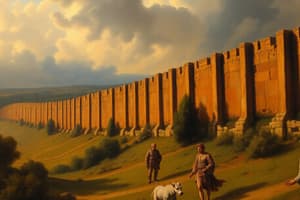Podcast
Questions and Answers
What caused the fall of the last Roman emperor in A.D. 476?
What caused the fall of the last Roman emperor in A.D. 476?
- Economic problems
- Barbarian invasion (correct)
- Political corruption
- Rise in Christianity
What action did many provinces in Rome take due to rising crime rates?
What action did many provinces in Rome take due to rising crime rates?
Enforced a curfew
What substance caused many rich Romans to die from health problems?
What substance caused many rich Romans to die from health problems?
Lead
What was a consequence of excessive military spending in the Roman Empire?
What was a consequence of excessive military spending in the Roman Empire?
What major issue did inferior technology cause in Rome?
What major issue did inferior technology cause in Rome?
What economic issue began after the reign of Marcus Aurelius?
What economic issue began after the reign of Marcus Aurelius?
What societal issue was exacerbated by political corruption in Rome?
What societal issue was exacerbated by political corruption in Rome?
How did Christianity impact Roman society?
How did Christianity impact Roman society?
What problem did unemployment create in the Roman Empire?
What problem did unemployment create in the Roman Empire?
Describe living conditions in Rome that contributed to urban decay.
Describe living conditions in Rome that contributed to urban decay.
Study Notes
Barbarian Invasion
- Germanic tribes invaded Roman territories, significantly contributing to the fall of the empire.
- In A.D. 476, the last Roman emperor was overthrown, marking the end of Roman rule in the West.
Decline in Morals and Values
- Increased crime rates in Rome led provinces to enforce curfews.
- A rise in cruelty and moral decay among Romans created a social environment of fear and instability.
Environmental and Public Health Problems
- Wealthy Romans were adversely affected by lead poisoning from drinking water supplied through lead pipes.
- The poorer class avoided exposure since they could not afford lead pipes, highlighting disparities in health impacts.
- The use of lead utensils also contributed to higher mortality rates.
Excessive Military Spending to Defend the Empire
- Enormous military expenses drained the Roman economy, leading to neglect of infrastructure like houses and roads.
- Prioritizing military needs resulted in widespread poverty among common citizens.
Inferior Technology
- Rome lagged in developing new machinery, leaving them at a disadvantage in military and agricultural productivity.
- Outdated farming tools decreased crop yields, impacting food supply and economy.
Inflation
- Inflation began after the reign of Marcus Aurelius, significantly destabilizing the economy.
- The intrinsic value of coins diminished due to reduced gold content, leading to economic hardship.
- Over_time, payments for taxes and salaries transitioned to food and clothing rather than currency.
Political Corruption
- Political instability characterized by power struggles, with 37 emperors ruling in a short span.
- Assassinations were rampant, with 25 out of 30 emperors meeting violent ends, disrupting governance and confidence.
Rise in Christianity
- Christianity brought about significant societal changes, promoting pacifism among followers.
- A considerable portion of governmental funds was redirected to support churches and monasteries, affecting state resources.
Unemployment
- Unemployment soared as cities became overcrowded with job seekers, exacerbating social issues.
- The emperor even resorted to importing grain to feed over 100,000 unemployed individuals in Rome, highlighting the economic crisis.
Urban Decay
- Majority of Romans resided in overcrowded, unsanitary apartment buildings with poor structural integrity.
- Frequent fires occurred due to inadequate ventilation and poor building regulations, compounding the living conditions' dire state.
Studying That Suits You
Use AI to generate personalized quizzes and flashcards to suit your learning preferences.
Description
Explore the factors that contributed to the fall of the Roman Empire, including barbarian invasions and a decline in societal morals. This quiz addresses environmental issues and the consequences of excessive military spending on Roman society. Test your knowledge on how these elements shaped the destiny of one of history's greatest civilizations.




